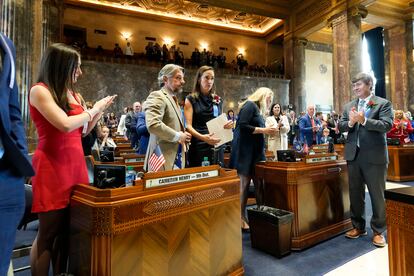Louisiana’s special session kicks off Monday. Here’s a look at what may be discussed
The session is scheduled to begin at 4 p.m. Monday. Landry, who called for the special session only a few hours after taking office, is expected to address the Legislature shortly after they gavel in

Louisiana’s newly inaugurated Legislature is set to convene for an eight-day special session Monday during which lawmakers will discuss items that could impact how the state conducts elections.
The focus of the session is to redraw Louisiana’s congressional map after a federal judge ruled that current boundaries violate the Voting Rights Act. Lawmakers also may explore new state Supreme Court districts and moving away from the state’s unique “jungle primary” system. Republican Gov. Jeff Landry has carved out 14 items that the Legislature can discuss.
The session is scheduled to begin at 4 p.m. Monday. Landry, who called for the special session only a few hours after taking office, is expected to address the Legislature shortly after they gavel in.
Here is a closer look at some of the items that are up for discussion:
A new congressional map
Lawmakers will have the opportunity to draw and replace the state’s current congressional map that a federal judge ruled dilutes the power of Black voters.
Louisiana’s current GOP-drawn map, which was used in the November congressional election, has white majorities in five of six districts despite Black people accounting for one-third of the state’s population. Another majority-Black district could deliver a second congressional seat to Democrats in the red state.
Democrats argue the map discriminates against Black voters and there should be two majority-minority districts. Republicans say the map is fair and argue Black populations in the state are too dispersed to be united into a second majority-Black district.
Baton Rouge-based U.S. District Judge Shelly Dick agreed with civil rights groups’ arguments and struck down Louisiana’s map for violating the Voting Rights Act in June.
Officials have until Jan. 30 to pass new congressional boundaries with a second majority-minority district. If they do not meet the deadline, a district court will hold a trial and “decide on a plan for the 2024 elections,” according to a November court order by the U.S. Court of Appeals for the Fifth District.
A new Supreme Court map
In December, a majority of justices on the Louisiana Supreme Court sent a letter to Landry asking lawmakers to also consider redrawing the court’s districts, saying it has been 25 years since their districts were redrawn and calling for a second majority-Black district, WDSU-TV reported.
Landry supports a second majority-Black district among the Supreme Court’s seven seats, The Times-Picayune/The New Orleans Advocate reported.
Some proposed boundaries already are being floated, with one plan to increase the number of justices from seven to nine, the Advocate reported.
Changing Louisiana’s open ‘jungle primary’ to closed
In a decades-old debate, lawmakers could look at an overhaul to Louisiana’s unique open “jungle primary” system, shifting the state toward a closed primary system.
Opponents argue the change would result in a myriad of issues, from logistics and costs to alienating political independents. Proponents of a closed primary say the current system puts Louisiana’s newest congressional delegation members at a disadvantage, as runoffs don’t occur until December, which is a month after nearly every other state has settled its seats.
Under a “jungle primary” or “majority vote primary,” all candidates regardless of party face each other on the same ballot. If no one candidate tops 50% in the primary, the top two vote-getters advance to a head-to-head runoff, which can end up pitting two Republicans or two Democrats against each other.
Sign up for our weekly newsletter to get more English-language news coverage from EL PAÍS USA Edition
Tu suscripción se está usando en otro dispositivo
¿Quieres añadir otro usuario a tu suscripción?
Si continúas leyendo en este dispositivo, no se podrá leer en el otro.
FlechaTu suscripción se está usando en otro dispositivo y solo puedes acceder a EL PAÍS desde un dispositivo a la vez.
Si quieres compartir tu cuenta, cambia tu suscripción a la modalidad Premium, así podrás añadir otro usuario. Cada uno accederá con su propia cuenta de email, lo que os permitirá personalizar vuestra experiencia en EL PAÍS.
¿Tienes una suscripción de empresa? Accede aquí para contratar más cuentas.
En el caso de no saber quién está usando tu cuenta, te recomendamos cambiar tu contraseña aquí.
Si decides continuar compartiendo tu cuenta, este mensaje se mostrará en tu dispositivo y en el de la otra persona que está usando tu cuenta de forma indefinida, afectando a tu experiencia de lectura. Puedes consultar aquí los términos y condiciones de la suscripción digital.








































